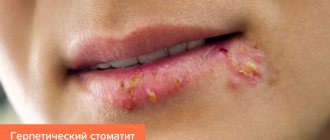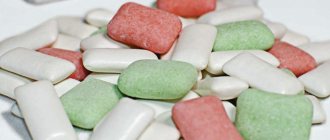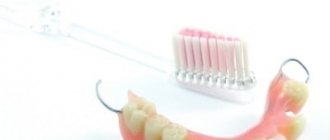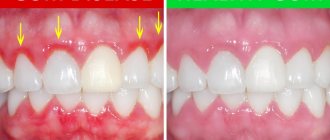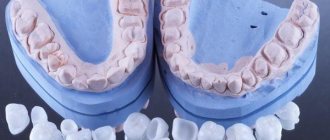Updated: 04/23/2021 15:29:35
Expert: Pogrebnoy Stanislav Leonidovich
*Review of the best according to the editors of expertology.ru. About the selection criteria. This material is subjective in nature, does not constitute advertising and does not serve as a purchase guide. Before purchasing, consultation with a specialist is required.
What to do if you think your breath smells bad? First of all, you need to make sure that this is true. Halitosis, or halitosis (the scientific name for this symptom), is sometimes fictitious, and is a sign of dissatisfaction with one's own body, the equivalent of inferiority, or a symptom of body dysmorphic disorder. A suspicious person, easily suggestible, imagines that strangers leaving him, for example, at a bus stop or on the subway, are leaving for a reason, but because his “breath stinks.” Dentists are also interested in people knowing more about this unpleasant phenomenon:
Therefore, how can you be sure whether there is an objectively unpleasant odor? The easiest way is to do it yourself. There are several ways.
Types of halitosis
- Physiological . This type of halitosis is associated with the physiological characteristics of the oral cavity and the predominantly putrefactive composition of the microflora of plaque on the back of the tongue. In this case, teeth and gums can be completely healthy.
- Pathological . In this case, the cause of bad breath may be various inflammations in the oral cavity or diseases of the internal organs.
- Pseudogalithosis . With this type of halitosis, there is a slight odor from the mouth, which is almost not felt by others, but bothers the patient himself. These cases are typical for people who suffered from true halitosis, successfully treated it, but continue to worry about bad breath.
Up to contents
Causes of bad breath
Local reasons
- Dental problems . One of the causes of bad breath is dental caries and its complications. In the cavities formed when teeth decay, food particles accumulate and bacteria actively multiply, which causes a stale odor.
- Gum diseases . Inflammation of the gums and oral mucosa can also cause halitosis.
- Insufficient oral hygiene . Insufficient care of teeth, gums, tongue, as well as orthodontic and orthopedic structures (prostheses, appliances, mouthguards, etc.) is a common cause of bad breath. As a result of neglect of daily hygiene, food particles accumulate between the teeth, on the back of the tongue, near the gums and on the elements of the denture, which become a favorable environment for the growth of bacteria. During the life of these microorganisms, highly volatile sulfur compounds are released, causing bad breath.
- Dry mouth syndrome . This syndrome is a common cause of bad breath. Due to the fact that saliva is produced slowly and in small quantities, the processes of natural cleansing of the oral cavity are disrupted and a breeding ground is created for the proliferation of pathogenic bacteria. Dry mouth can be caused by: diseases of the salivary glands,
- diabetes mellitus,
- vitamin deficiency,
- radiation damage,
- botulism,
- taking certain medications.
Common reasons
- Nutritional pattern . The development of bad breath is promoted by eating protein-rich meat and dairy products. During their processing, alkaline compounds are formed that change the acid-base balance in the oral cavity. At the same time, microorganisms begin to actively multiply, causing bad breath. Eating foods containing large amounts of carbohydrates, on the contrary, helps reduce the intensity of the odor.
- Somatic diseases . The appearance of an unpleasant odor is caused by: some diseases of the digestive system,
- liver pathology, severe lung diseases,
- pathology of ENT organs.
Up to contents
Dentist reviews
St 12 is a rinse that eliminates repulsive odor for a longer period than other similar products. This is possible thanks to zinc acetate, but the drug only masks the odor, so if you stop rinsing, the problem will return.
Cb12 does not fight the cause of the odor, being just a remedy that eliminates symptoms (like paracetamol used at high temperatures). Since the composition contains chlorhexidine, it is highly not recommended to use the rinse aid for more than 3 weeks without a break. True, the manufacturer claims that the concentration of chlorhexidine is quite low (0.025%), which cannot cause oral dysbiosis, but this is not the case.
A chlorhexidine concentration of 0.05% is considered the most optimal for actively suppressing bacterial activity (you can rinse your mouth with this solution for no more than 10 days). A decrease in concentration leads to a decrease in the effectiveness of the drug and addiction to it. This is fraught with the development of aggressive microflora, inflammation of the gums after discontinuation of the drug and dysbacteriosis, as a result of which the smell may even intensify.
This does not mean that you need to completely abandon the use of this rinse, but it is still better not to do a course lasting more than 3 weeks, and then take a break for a month or more. Alternatively, you can use mouthwash only in situations where it is needed: before an important business or personal meeting, when pleasant, fresh breath is simply necessary, but brushing your teeth is impossible.
For permanent use, it is better to buy a product without antiseptics. Even better if they contain essential oils, sodium fluoride and menthol.
Since the composition contains alcohol (1.7%), the use of St. 12 by drivers is allowed with caution. As for rinsing the mouth with this product by pregnant women and nursing mothers, there are no contraindications in the instructions for this, however, due to the presence of the same alcohol, it is not recommended to use the drug for a long time.
How to identify bad breath
Spoon or napkin test.
With a spoon. The plaque is removed from the back third of the tongue using a plastic spoon. After 1 minute, the smell is assessed by the patient himself or a trusted person conducting the test.
With a napkin. You can also use a sanitary napkin to remove plaque from the back of your tongue. To do this, stick it out as far as possible, holding it by the tip. The back third of the tongue is wiped with a clean napkin and its smell is assessed after 40-45 seconds. The results of such a test make it possible not only to identify halitosis, but also to determine the source of the microorganisms that provoke it - plaque on the back of the tongue.
Dental floss test.
The spaces between the upper and lower molars are cleaned with unscented and unwaxed dental floss.
Then they look at what color the used section of thread was dyed. A yellow tint indicates the presence of plaque, a red tint indicates bleeding gums. Both signs are factors that contribute to the development of halitosis.
30-40 seconds after cleaning the interdental space, the smell of the floss is assessed.
Organoleptic measurement of breath odor.
The dentist assesses the intensity and nature of bad breath. To obtain accurate test results on the eve of the test, the patient and the researcher should refrain from taking antimicrobial drugs, eating spicy foods, seasonings, onions and garlic (2 days before the test), and using scented cosmetics (one day before the test). For 12 hours before the measurement, the patient should not smoke, brush his teeth, use mouthwash, breath fresheners or chewing gum.
Up to contents
Сb12: price of the drug and instructions for use
The product cannot be called cheap: a 250 ml tube costs about 650 rubles. Unfortunately, there are no analogues, so it is not yet possible to find an equivalent but cheaper replacement.
It is recommended to use the mouthwash twice a day. The best effect will be achieved if you do this immediately after proper brushing of your teeth. Take 10 ml of solution, after which the mouth is rinsed for one minute. It is easy to calculate that if you rinse twice a day, one package of the product will last for 12-13 days.
How to eliminate bad breath
Regular oral hygiene. Regular oral care is one of the main ways to combat unpleasant odor. To fix the problem you need to:
- brush your teeth at least 2 times a day;
- Use floss or mouthwash after every meal. LISTERINE® rinses will do an excellent job of eliminating unpleasant odors;
- clean the tongue of plaque, which is a breeding ground for the proliferation of microorganisms.
Elimination of dental problems. Since the cause of unpleasant odor can be various inflammations in the oral cavity and dental problems, you should regularly visit the dentist for timely detection of diseases and their treatment. The doctor carefully examines the mucous membrane, periodontium and teeth, and examines the ducts of the salivary glands. If necessary, professional sanitation of the oral cavity is carried out, including removal of plaque and tartar, treatment of caries and its complications, elimination of foci of infection, etc. Sometimes it may be necessary to replace dentures with new ones that meet modern dental standards.
Correction of diet. It is recommended to eliminate from the diet foods that cause bad breath: onions, garlic, peppers, cheeses, salami, etc. They contain cysteine, which with the participation of microorganisms is converted into hydrogen sulfide. The latter often causes bad breath.
Rejection of bad habits. To eliminate the unpleasant odor, it is recommended to stop smoking and drinking alcoholic beverages.
Up to contents
Treatment of bad breath
Treatment of the underlying disease. Sometimes halitosis is a symptom of some systematic disease of the body. Bad breath can occur when:
- dysfunction of the gastrointestinal tract,
- renal and liver failure,
- ENT diseases,
- problems with the bronchopulmonary system, etc.
In this case, to eliminate halitosis, the underlying disease is diagnosed and treated (conservative, physiotherapeutic, etc.).
Up to contents
Treatment of dental diseases
- filling teeth affected by caries,
- tooth extraction if treatment is impossible,
- treatment of inflammatory gum diseases.
Use of local medicines. Today there is a wide range of products that help get rid of bad breath:
- toothpastes,
- dental gels,
- lozenges, etc.
Before using them, you should consult your doctor.
Up to contents
Description of the product
The mouthwash is available in 250 ml tubes. It contains the following components:
- chlorhexidine, which is an antiseptic substance that inhibits the development of bacteria. The drug is often used for inflammation and gum disease;
- zinc acetate, which has the property of neutralizing sulfur compounds produced in large quantities by microorganisms, which is the main cause of odor;
- sodium fluoride, which strengthens tooth enamel, has an anti-caries effect and inhibits the development of pathogenic bacteria.
- alcohol;
- menthol scented fragrance.

